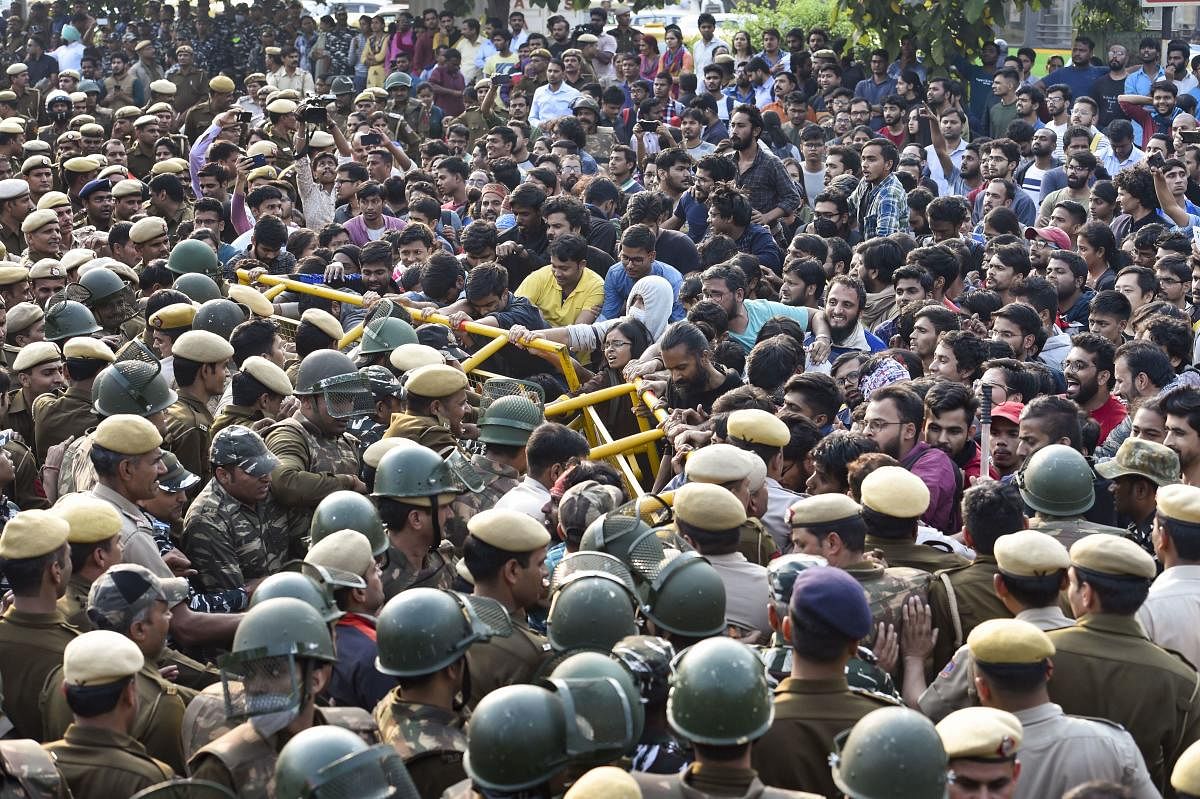
Why is it that our public universities are becoming increasingly turbulent? With angry students, unhappy teachers and stubborn/non-dialogic administrators, the idea of a university as an intersubjective space for dialogue, communication and dissemination and transaction of multiple knowledge traditions and politico-ethical worldviews, it seems, is in danger.
See a pattern? Recently, as it was reported, goons and bouncers were hired to attack the students at Jamia Millia Islamia who were protesting against the administration. At Shantinekatan — yes, Tagore’s Shantinekatan — a permanent police camp is set to be installed. And seldom does one get any positive news from JNU; the administration seems to be determined to destroy the core principles and values of this iconic university.
It is sad to see this state of affairs as we witness the death of the ideals of education as put forward by the likes of Rabindranath Tagore, Zakir Hussain and Jawaharlal Nehru. If public universities begin to crumble, we would lose the spirit of a democratic/egalitarian ideal of affordable/good quality education — particularly for those who could not buy what the fancy private universities sell in the age of massive commodification of education.
Yes, with a sense of gratitude, I recall the role of public universities in my own life. My father — a government official — was the only source of income for the family consisting of many siblings. And it was because of good and affordable public institutions like Presidency College in Kolkata and JNU in Delhi that I got my education.
No, it was not merely a degree; a university like JNU altered my worldview and enriched my horizon. I could see great minds coming from remote territories of the country and marginalized sections of this ruthlessly hierarchical society. This sensitivity to heterogeneity humanized me and democratized my consciousness.
As a teacher, I have also witnessed amazing narratives: a poor Muslim boy from Darbhanga in Bihar excelled in academics, and emerged as a radical activist; an underprivileged student from Odisha evolved as an immensely sensitive mind, and became a good teacher at a leading college in Delhi University; or a tribal girl from Manipur wrote quite a significant PhD thesis, and joined the Indian Civil Service. Yes, these are the possibilities implicit in a good public university. It questions the continual reproduction of social inequality; it makes one believe that ‘merit’ or ‘cultural capital’ is not the exclusive privilege of the select few: those who go to Doon school and migrate to England and America.
Is it that with the assertive discourse of neoliberal capitalism, the ruling regime is becoming uncomfortable with even the slightest trace of the State’s welfarist policy? Is it that the new middle class — a product of market-oriented/consumptionist corporate culture — has become absolutely hostile to the idea of a public university?
As education becomes a commodity (a packaged product, or a merely techno-managerial skill), the culture of public universities — say, the prevalence of ‘non-utilitarian’ humanities and social sciences, or the ethos of political debate, argumentation and contestation relating to caste, gender, nation and identity — is not always appreciated by those who wish to buy only the job-oriented ‘skills’ in sanitized/insulated/overpriced private institutions. Is it the reason that these days there is so much negative reporting about any movement that takes place in a public university? It is sad to see how some of our ‘patriotic’ television channels have castigated JNU as ‘anti-national’. After all, it should not be forgotten that the proponents of totalitarian politics always hate and fear young minds who think, question and reflect.
I have no hesitation in saying that many of our students have demonstrated an extraordinary spirit of courage. They make me believe that a university is not a factory for manufacturing ‘loyal conformists’; instead, the goal of liberating education is to activate the spirit of critical thinking. The other day, I received a message from a student. “ Sir, I am boycotting the JNU convocation. At a time when the entire university is in turmoil, and with the proposal of enhancing hostel fee — and that too in a completely undemocratic fashion, many underprivileged students are likely to lose the right to education, my conscience doesn’t permit me to take the PhD degree from the Vice-Chancellor or the dignitaries”.
Yes, I felt proud of my student’s act of dissent. Her rebellion became an act of critical pedagogy. And at times, I feel proud when I hear these young minds speaking: the way, with extraordinary clarity, they debunk the entire politics that conspires against public universities. It is refreshing to see young minds not merely preoccupied with ‘placement’ and ‘salary package.’
But then, it is sad to see the role of our administrators. They have ceased to be teachers and communicators. There is no trace of Paulo Freire or M K Gandhi in their deserted souls. As they see every act of resistance as a ‘law and order’ problem, they miss the opportunity to enter the inner world of young minds: their academic aspirations amid societal pressures, their quest for self-actualization amid the tyranny of authoritarian personalities, and their experiments with politics and culture. As eternally insecure academic bureaucrats, they miss what a relaxed mentor possesses: the art of listening and the ethics of care. Not solely that. Quite often, as politically appointed Vice-Chancellors, they lose their conscience — their creative agency.
As a result, these days our public universities are further stigmatized and humiliated through the presence of cops and paramilitary forces, the use of the ever-expanding technologies of surveillance, the constant bombardment of showcause notices, chargesheets and circulars, and the intellectual poverty of petty administrators. Is it the sign of the rising authoritarianism in the era of neoliberal capitalism?
(The writer is Professor of Sociology, JNU)